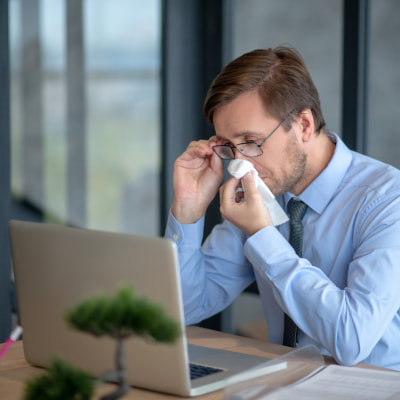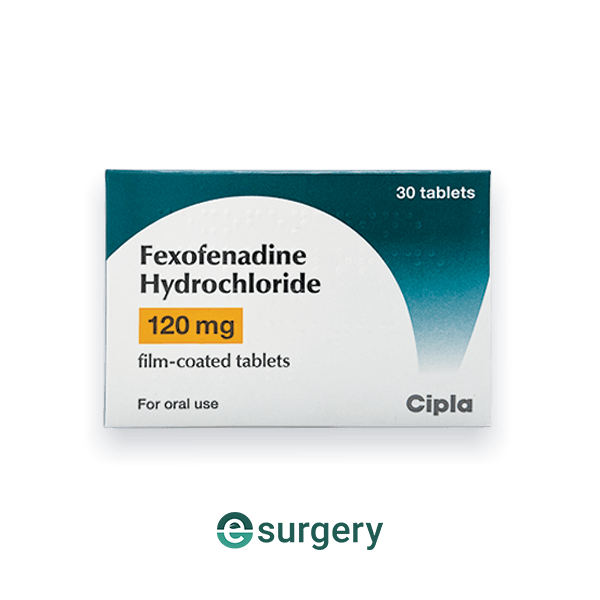
Are your hay fever symptoms worse at night compared to during the day?
Have you had enough of sneezing and itchy, dry eyes? Allergies can be very bothersome and keep you awake all night, especially between late March and September, when hay fever is at its worst due to the weather being hot, humid, and windy as the pollen count is at its peak at this time. If you’re frustrated with your hay fever symptoms at night and want to find a solution, keep reading.
What causes hay fever?
Do you get a sneezing fit from walking past a patch of newly cut grass? Pollen from grass, trees, plants, and weeds causes hay fever, a common allergy. It’s also known as “seasonal rhinitis,” It flares up in the early spring and summer months when the body produces allergy antibodies in response to allergens like pollen. Many people also suffer from hay fever symptoms at night. [1] (Luckily there are some allergy home remedies that can help!)
Symptoms of hay fever

So, how can you tell if you have hay fever symptoms or if you have something else going on? Doctors are your best option to figure out what’s causing your allergies. However, a few mild hay fever symptoms can help you figure out if you have it or not.
- Sneezing and coughing
- Itchy, watery, or red eyes
- Itchy throat, nose, or mouth
- Runny nose or nasal congestion
- Loss of smell
Your symptoms can worsen if you smoke or live with poor air quality that might have a lot of smoke and dust. Worsened symptoms may cause:
- Sinus pressure and pain in the forehead and temples
- Headaches
- Earache
- Tiredness
People who have asthma may have worse symptoms such as:
- Shortness of breath
- Tight chest
- Wheezing
In contrast to a cold, which generally lasts 1 to 2 weeks, hay fever can last weeks or months. It is also important to keep up to date with the latest advice and regulation around Covid-19, as it can share some symptoms with hay fever.
How to cope with hay fever symptoms
Unfortunately, there is no cure for hay fever, and there is no way to prevent it. When the pollen count is high, here are a few simple steps you can take to alleviate your symptoms and stop them from getting worse:
- After being outside, shower and change your clothes to remove pollen stuck to your clothes.
- Wraparound sunglasses can be a great solution to avoid pollen entering your eyes.
- Vaseline can be applied around the nostrils to keep pollen out.
- Purchase a pollen filter for your car’s air vents and a vacuum cleaner with a HEPA filter.
- Stay indoors on windy days and avoid going to places with a lot of greenery.
- Regular vacuuming and dusting with a damp cloth can be very helpful.
- Refrain from keeping fresh flowers in your home.
- Avoid smoking or being around people who smoke.
- If you have pets, bathe them before they enter the house, as they can bring pollen inside.
- Keep entryways shut to prevent pollen from getting into your house.
- Mold can also cause hay fever symptoms, so use a dehumidifier to keep it under control.
- Invest in hypoallergenic bedding. [2]

Are hay fever symptoms at night worse & why?
It is evident that your pollen exposure will be higher throughout the day. However, for some people, hay fever and allergies manifest themselves at night. This can be explained by the fact that pollen is relatively minor and does not weigh much. When the sun shines brightly, heated air rises, carrying the pollen. When the air cools down at night, the pollen settles back to the ground. Pollen showers are another name for this process, and it’s the most likely cause of your hay fever symptoms at night. [3]
Medications for controlling hay fever symptoms
Many treatment options, such as Sodium Cromoglicate 2% Eye Drops, Beconase Nasal Spray, Fexofenadine Tablets, and Telfast Tablets (a branded version of Fexofenadine), are now available on e-Surgery online. If you take them before the pollen is in the air, you might be able to avoid having symptoms. If your symptoms are severe, you may need to see a doctor and get prescription medicine. It is critical to make sure that you consult with a doctor before starting any new medication to rule out any medication interactions. To find out more check out our handy guide to choosing the right nasal spray for your allergies.
 |
 |
 |
|
Herbal remedies for hay fever
Butterbur is a shrub that has been shown to help with hay fever symptoms. The plant in its natural state might be poisonous. Look for a product that says “PA-free.” Additionally, Capsicum, honey, vitamin C, and fish oil are some other herbal remedies, although further research is needed to see how effective they are. Some people use acupuncture to treat hay fever. However, every individual is different, so what works for one individual may not work for you. So give these remedies a shot to relieve hay fever symptoms at night and discover which ones work best for you. [4]
Sources
- Hay Fever At Night – Is It Allergic Rhinitis? | Woolroom
- Hay fever | NHS
- Why Hay Fever Is Worse at Night | Time4Sleep
- Hay Fever (Allergic Rhinitis): Causes of Seasonal Allergies | WebMD
Further Reading
- When hay fever is worse at night | Allergy Cosmos
- Why are my Hay Fever Symptoms Worse at Night? | Sleepeezee
- Why hayfever symptoms can get worse at night | A.Vogel








